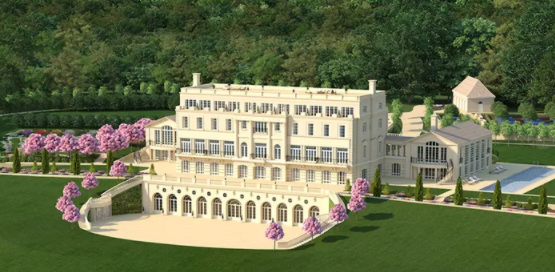A new stately home — the biggest for a hundred years, according to The Sun — is to be built near Ramsden in Oxfordshire. Or rather, a plot of land with the requisite planning permission has just gone on the market. The proposed “mega mansion” would cover 68,000 square feet and contain more than sixty rooms. Spacious.
Predictably, the news has been met with outrage. It doesn’t help that the house has been compared to Pembroke, the palatial Long Island residence that helped inspire The Great Gatsby. At a time when affordable housing is in such sort supply, why are we literally laying plans for a new Gilded Age? Is there any excuse of such extravagance in the 21st century?
Yes, there is. Assuming that we’re not going to tax the ultra-rich out of the country, the issue moves on to what they do with their wealth. Ideally, we’d want them to prioritise philanthropy or investment in job-creating enterprise — but, failing that, it’s better for the economy if they spend their money than squirrel it away.
Building a new stately home is a more constructive way than most of splashing the cash. If the architecture and decoration is of the highest standard, then it wouldn’t just provide employment for artists and craftspeople, it would also make a 21st century contribution to our national heritage.
Today, we enjoy visiting stately homes like Blenheim Palace and Highclere Castle — plus thousands of other fine houses. Of course, most of them stand as a testament to the inequalities of their era; and yet our towns and countryside would be greatly diminished by their absence. Wouldn’t it be sad if our own era left nothing behind for future generations to admire?
In any case, we should be much more worried about the money that the rich don’t spend. Much of it finds its way into the property market, thus driving up the cost of land — and therefore house prices and rent levels. This sort of ‘investment’ (in fact, speculation) does a lot more to fuel inequality than the realisation of a grand design.
There’s scope here for a deal: let the rich build their big houses on land specially allocated for the purpose, but close-off the mainstream property market to their surplus millions. Reducing the amount of money chasing the finite supply of rental property and building sites would benefit tenants and first-time buyers.
Of course, if we do grant planning permission for a stately home on a country estate, then the value of that acreage would be greatly increased. That would mean a huge windfall profit — unless, of course, the lucky landowner has to pay handsomely for the privilege. Re-allocated to a local council, the proceeds could be used to build new homes and community centres or for conservation work and improving access to the countryside.
In a globalised economy, expropriating the rich is a fruitless pursuit. But there are other ways of making their money work for everyone.











Join the discussion
Join like minded readers that support our journalism by becoming a paid subscriber
To join the discussion in the comments, become a paid subscriber.
Join like minded readers that support our journalism, read unlimited articles and enjoy other subscriber-only benefits.
Subscribe